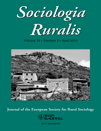
SOCIOLOGIA RURALIS
Scope & Guideline
Illuminating Sociopolitical Structures in Rural Settings
Introduction
Aims and Scopes
- Rural Social Dynamics:
Explores the social structures and relationships within rural communities, including issues of identity, belonging, and community resilience. - Sustainability in Agriculture:
Investigates practices and policies that promote sustainable agricultural systems, with an emphasis on environmental, economic, and social sustainability. - Food Systems and Networks:
Analyzes alternative food networks, food justice, and the socio-economic implications of food production and consumption in rural areas. - Cultural Perspectives on Rurality:
Examines how cultural narratives and practices influence rural life, including gender roles, migration, and the impact of globalization. - Governance and Policy Analysis:
Focuses on the governance structures affecting rural development, including local policies, community engagement, and the role of institutions. - Interdisciplinary Approaches:
Encourages interdisciplinary research that integrates sociological perspectives with insights from environmental studies, economics, and cultural studies.
Trending and Emerging
- Digital Transformation in Agriculture:
There is an increasing emphasis on the impact of digital technologies in rural settings, exploring how innovations like precision agriculture and digital agri-food systems reshape farming practices and rural livelihoods. - Intersectionality and Diversity:
Research is increasingly focused on the intersection of various identities (e.g., gender, race, disability) within rural contexts, examining how these factors influence experiences and opportunities. - Mental Health and Wellbeing in Rural Communities:
More studies are addressing the mental health challenges faced by rural populations, particularly in light of crises such as the COVID-19 pandemic and its socio-economic repercussions. - Environmental Justice and Climate Change:
Emerging research highlights the vulnerabilities of rural communities to climate change and environmental degradation, emphasizing the need for justice-oriented approaches to sustainability. - Community Resilience and Social Innovation:
A growing body of work is dedicated to understanding how rural communities adapt and innovate in response to socio-economic challenges, focusing on grassroots initiatives and local governance.
Declining or Waning
- Traditional Agricultural Practices:
Papers focusing on conventional farming methods and their socio-economic implications have decreased, possibly due to a growing interest in sustainable and innovative agricultural practices. - Rural-Urban Dichotomy:
Research that strictly contrasts rural and urban experiences is waning, as scholars increasingly recognize the fluidity and interconnectedness of rural-urban relations. - Homogeneous Rural Experiences:
There is a noticeable decline in studies that portray rural life as a uniform experience, with more emphasis now on diversity and intersectionality within rural contexts. - Static Views of Rural Economies:
The focus on static economic models within rural areas has diminished, giving way to dynamic analyses that consider the impact of globalization and migration on rural economies. - Rural Tourism as a Sole Focus:
While still relevant, studies that solely concentrate on rural tourism without considering broader socio-economic factors are becoming less prevalent.
Similar Journals
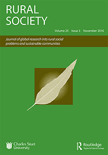
Rural Society
Bridging Theory and Practice for Rural AdvancementRural Society, published by Routledge Journals, Taylor & Francis Ltd, is a prominent academic journal dedicated to exploring the complexities and dynamism of rural communities. Since its inception in 1991, the journal has served as a critical platform for advancing interdisciplinary research in the fields of tourism, leisure, and hospitality management, particularly in the context of rural societies. With an ISSN of 1037-1656 and an E-ISSN of 2204-0536, Rural Society has carved out a niche within the Q3 category of Scopus rankings, reflecting its commitment to high-quality research despite its positioning in the 26th percentile among its peers. This journal is vital for researchers, practitioners, and students alike, offering valuable insights into sustainable practices, social dynamics, and economic development within rural settings. While it does not currently offer open access, Rural Society continues to foster academic dialogue and innovation, providing readers with access to crucial findings that directly inform policies and practices impacting rural life.
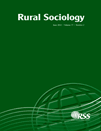
RURAL SOCIOLOGY
Unveiling the Complexities of Rural ExistenceRural Sociology, an esteemed journal published by Wiley, serves as a pivotal platform for the dissemination of research within the Sociology and Political Science fields, featuring the ISSN 0036-0112 and E-ISSN 1549-0831. With a commendable impact factor and esteemed ranking as Q1 in the 2023 category quartiles for Sociology and Political Science, this journal stands out, placed in the top 85th percentile in its domain according to Scopus metrics. Since its inception in 1978, Rural Sociology has provided scholars and practitioners with critical insights into rural communities, social structures, and the political frameworks that shape them, thus fostering a deeper understanding of these often-overlooked areas. The journal is essential reading for those dedicated to advancing knowledge in rural studies, with a diverse range of articles that inform policy, practice, and academic scholarship. To access the latest research and contribute to ongoing conversations in the field, visit the journal's page on Wiley's platform.
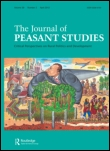
JOURNAL OF PEASANT STUDIES
Illuminating the Complexities of Peasant StudiesJOURNAL OF PEASANT STUDIES, published by ROUTLEDGE JOURNALS, TAYLOR & FRANCIS LTD, stands at the forefront of interdisciplinary research, exploring the dynamics of rural communities and agrarian movements within the fields of Anthropology, Cultural Studies, and Arts and Humanities. With an impressive ranking in the 2023 quartiles, positioned in the Q1 category across multiple disciplines, this journal serves as a vital platform for scholars seeking to understand the complexities of peasant lives, land use, and social transformations. Hailing from the United Kingdom and established in 1973, it continues to thrive, maintaining rigorous peer review standards and a focused scope that attracts high-impact research. Although it is not an open-access journal, it provides vital insights and fosters critical dialogue among researchers and practitioners alike, assisting them in addressing contemporary social issues and advocating for rural rights and identities. With an enduring commitment to advancing knowledge and scholarship, the journal plays an essential role in shaping academic discourse in its fields.
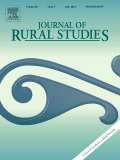
Journal of Rural Studies
Empowering Rural Discourse Through ScholarshipWelcome to the Journal of Rural Studies, a premier peer-reviewed publication dedicated to advancing the field of rural research. Published by PERGAMON-ELSEVIER SCIENCE LTD, this esteemed journal has been a cornerstone of scholarly discourse since its inception in 1985 and continues to evolve through 2024. With an impressive impact factor and categorization in the Q1 tier across various fields, including Development, Forestry, Geography, Planning and Development, and Sociology and Political Science, the journal is among the elite voices in rural studies. Researchers, professionals, and students alike will find invaluable insights within its pages, supported by rigorous empirical research and theoretical explorations that address the complexities of rural life and its myriad challenges. While it currently does not offer open access, the subscription model ensures a broad dissemination of knowledge, fostering collaboration and innovation within the academic community. With a robust Scopus ranking that places it in the top percentiles across multiple social sciences, the Journal of Rural Studies remains an essential resource for those dedicated to understanding and improving rural environments worldwide.
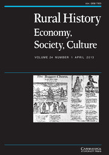
Rural History-Economy Society Culture
Advancing Insights into the Dynamics of Rural History and Culture.Rural History: Economy Society Culture is a vital academic journal dedicated to exploring the multifaceted aspects of rural history from economic, societal, and cultural perspectives. Published by Cambridge University Press, this journal contributes substantially to the field by presenting innovative research that spans a range of disciplines, including history, geography, and urban studies. With a convergence of scholarship from 1990 through 2024, this journal holds significant rankings in the top quartiles of its categories, particularly excelling in History where it ranks in the Q2 quartile. It also demonstrates respectable positions in other arts and humanities domains, reflecting its considerable impact, especially in history-related studies, where it sits in the 76th percentile. While not open access, it provides valuable insights for researchers, professionals, and students passionate about understanding the dynamics of rural societies and their historical underpinnings. For scholars aiming to contribute to this rich dialogue, Rural History serves as an essential platform for disseminating significant findings and advancing knowledge in the field.

Studies in Agricultural Economics
Fostering Collaboration for a Sustainable FutureStudies in Agricultural Economics is a premier journal published by AGRARGAZDASAGI KUTATO & INFORMATIKAI INTEZET in Hungary, focusing on innovative research in the interdisciplinary fields of agricultural, biological, and economic sciences. Since becoming an Open Access journal in 1997, it has aimed to enhance the visibility of agricultural economics scholarship while promoting global engagement among researchers, practitioners, and policymakers. With its robust Q2 and Q3 rankings across varied categories including Development and Geography, this journal serves as a significant platform for disseminating cutting-edge studies that address crucial issues in agriculture and rural development. The journal's continuous publication since 2011 until 2024 exemplifies its commitment to providing timely insights into evolving agricultural challenges. With a strong Scopus ranking across multiple domains, particularly in the social sciences and agricultural sectors, it stands as a vital resource for anyone looking to advance knowledge and practice in these critical areas.
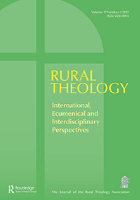
Rural Theology-International Ecumencial and Interdisciplinary Perspectives
Bridging Faith and Community in Rural ContextsRural Theology: International Ecumenical and Interdisciplinary Perspectives is a pivotal journal published by Routledge Journals, Taylor & Francis Ltd, dedicated to the exploration and discourse surrounding the interplay of theology in rural contexts. With an impressive Q1 ranking in Religious Studies and a substantial Scopus rank of #49 out of 644, the journal stands as a leading platform for innovative research and scholarly dialogue. It encompasses a diverse range of perspectives, encouraging interdisciplinary collaboration and contributing to the vibrant field of rural theology, particularly within ecumenical frameworks. Although Access options are currently not designated as Open Access, the journal remains indispensable for researchers, practitioners, and students keen on analyzing the theological dimensions of rural life. Since its inception in 2014, Rural Theology has committed to elucidating the unique challenges and opportunities that rural communities face, making it essential reading for anyone invested in this vital area of study.
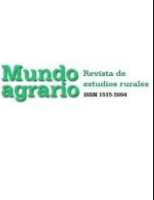
Mundo Agrario
Unveiling the socio-economic dimensions of agriculture.Mundo Agrario is a reputable open-access journal published by Universidad Nacional de La Plata, Facultad de Humanidades y Ciencias de la Educación, specializing in the interdisciplinary fields of Agricultural and Biological Sciences, Geography, History, and Urban Studies. Established in 2000, this journal has become an essential platform for scholars and practitioners alike, promoting innovative research and discussions that address critical issues in the agricultural and social landscapes of Argentina and beyond. With a commitment to enhancing accessibility to scholarly work, Mundo Agrario is indexed in multiple categories, including a Q4 ranking in Agricultural and Biological Sciences and Geography, and a Q2 ranking in History, reflecting its diverse scholarly contributions. The journal encourages submissions that explore the intersection of agricultural practices, urban development, and historical perspectives, thus fostering a comprehensive understanding of the societal implications of these disciplines. For researchers, professionals, and students looking to stay informed about trends and discoveries in these areas, Mundo Agrario remains a vital resource for knowledge dissemination and academic exchange.

Revista Espanola de Estudios Agrosociales y Pesqueros-REEAP
Engaging Minds on Contemporary Challenges in Rural SpainRevista Espanola de Estudios Agrosociales y Pesqueros (REEAP) is a prominent academic journal dedicated to advancing knowledge in the fields of agricultural, social, and fisheries studies. Published by the esteemed Ministerio Agricultura Pesca & Alimentacion, Secretaria General Tecnica, this journal provides a critical platform for researchers, professionals, and students to disseminate their findings and insights. Although specific impact metrics are not available, REEAP is recognized for its commitment to high-quality research, focusing on contemporary issues that affect rural and fishing communities in Spain and beyond. The journal encourages open scholarly dialogue and exploration of sustainable practices, policy implications, and socio-economic factors influencing agriculture and fisheries. With its strategic location in Madrid, the journal aims to foster interdisciplinary collaboration and engage a diverse readership interested in the complex interplay between agriculture, social dynamics, and environmental stewardship.

Fennia-International Journal of Geography
Connecting scholars through transformative geographical research.Fennia-International Journal of Geography is a prominent peer-reviewed journal published by the Geographical Society of Finland, dedicated to advancing the field of geography through innovative research and critical discourse. With an ISSN of 0015-0010 and an E-ISSN of 1798-5617, this journal has established itself as a vital resource for academics and professionals alike since its inception in 1976. Notably transitioning to an Open Access model in 2010, Fennia provides wide accessibility to its content, fostering a global exchange of ideas and findings in various sub-disciplines of geography. The journal is currently categorized in the Q2 quartiles for Ecology, Forestry, and Geography, Planning and Development, indicating its influential standing among scholarly publications. Its Scopus rankings reflect its relevance and significance, including a 63rd percentile rank in Agricultural and Biological Sciences, and a 59th percentile in Social Sciences. Fennia serves as a crucial platform for the dissemination of research findings, policy analysis, and theoretical explorations, thereby greatly contributing to the understanding and development of geographical sciences globally.